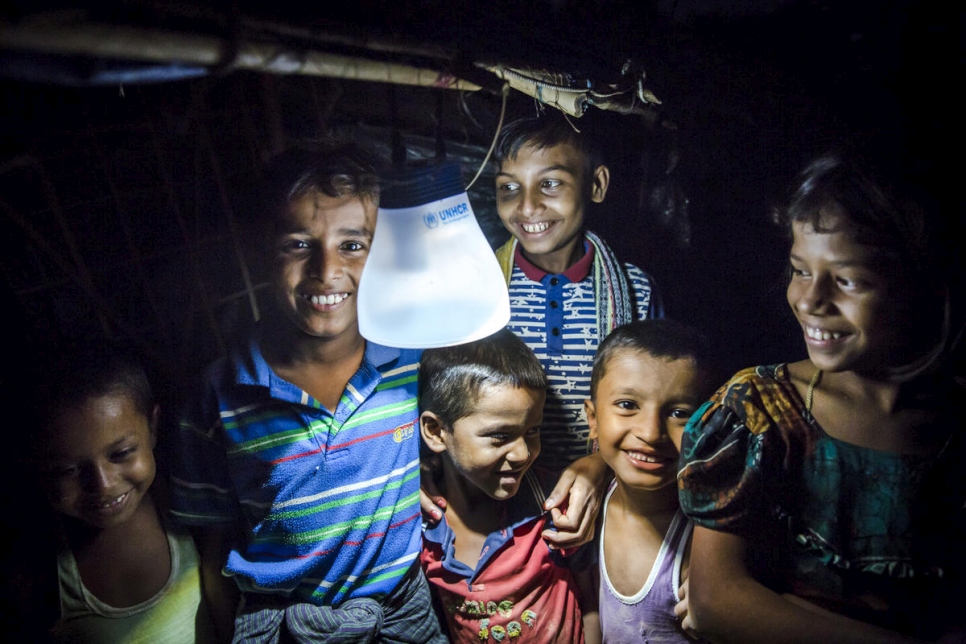UNHCR launches sustainable energy strategy, strengthens climate action

A Rohingya refugee family light up their shelter with solar lantern, Kutupalong, Bangladesh, November 2017. © UNHCR/Andrew McConnell
In recognition of the growing climate crisis and to boost refugees’ access to safe and sustainable energy, while minimizing its own environmental impact, UNHCR, the UN Refugee Agency, launched a four-year Global Strategy for Sustainable Energy.
The strategy promotes the transition to clean, renewable energy at refugee camps and hosting sites, including for individual households, communal areas and support facilities.
“There is no escaping the fact that climate change is contributing to underlying causes of conflict and displacement. From drought and famine to more frequent extreme weather events, the impacts of climate change are being most acutely experienced by the world’s most vulnerable and marginalised, including refugees and their host communities,” said UNHCR’s Director of Programme Support and Management, Andrew Harper.
According to current estimates, more than 90 per cent of refugees in camps have limited access to electricity, making it difficult for them to cook, keep warm, learn, work or find their way around at night while also exposing them to various protection and health risks.
A lack of clean energy results in many refugees burning firewood or charcoal to meet their critical, household needs, while community and support facilities are often fuelled by diesel generators. All these sources of energy have heavy environmental and financial costs.
“Most of those displaced seek refuge in some of the most vulnerable areas in the world,” said Harper.
“This poses significant humanitarian and environmental challenges. We need to ensure that those forced to flee are able to meet their basic energy needs in exile, while also minimizing environmental degradation and protecting the livelihoods of host communities.”
UNHCR has been working for several decades to reduce the environmental impact of refugee crises. Some key initiatives include the establishment of solar farms in Azraq and Za’atari refugee camps in Jordan; the provision of clean cooking fuel in Niger; clean fuel and a waste treatment plant for refugees in Bangladesh; and renewable energy and clean cooking solutions for refugees in Rwanda, Tanzania and Ethiopia.
UNHCR has also been pioneering modern and innovative land restoration projects such as the “Green Refugee Camp” project in Cameroon, which ensured the reforestation of more than 100 hectares of severely degraded land in and around Minawao Refugee Camp and the creation of 175 local jobs. The project was selected as a model for Global Best Practice for delivering on the Sustainable Development Goals (SDGs) during the UN General Assembly SDG Summit this year.
UNHCR’s new Sustainable Energy Strategy builds upon current initiatives to mainstream access to sustainable energy and minimize environmental impact across UNHCR field operations worldwide.
The strategy focuses on four key areas; ensuring that refugees meet their essential energy needs from the beginning of an emergency; improving refugees’ access to clean and affordable energy to cook, and heat and light their households; and ensuring clean energy to run refugee community and support facilities such as central water supplies, street lighting, schools and health centres.
To implement the strategy, UNHCR will advocate for and facilitate access to clean energy for refugees and displaced populations, working closely with energy providers to promote the connection to national energy grids, as well as decentralized renewable energy mini-grid systems, to support both refugees and host communities in the area.
Key partners, such as the IKEA Foundation, the Dutch Postcode Lottery and the governments of Denmark, Germany, Japan, Norway, Sweden, the Netherlands and the United States of America, have already been instrumental in helping UNHCR expand its environmental and energy initiatives in operations around the world.
More support, partnerships and joint efforts between humanitarian, development and private actors will be required to finance and deliver sustainable energy to those in need.
The Global Compact on Refugees calls for increased investment in renewable energy in refugee host countries to secure refugee access to fuel and energy. It also encourages integrated and sustainable management of natural resources and ecosystems in or near refugee hosting rural and urban areas.
The first ever Global Refugee Forum, a world meeting on refugees, which will be held on 17 and 18 December, will also be an occasion for the international community to pledge to pursue innovative solutions in ensuring access to clean energy for refugees and host communities as well as greener humanitarian responses.
For more information on this topic, please contact:
- Shabia Mantoo, [email protected], +41 79 337 76 50
